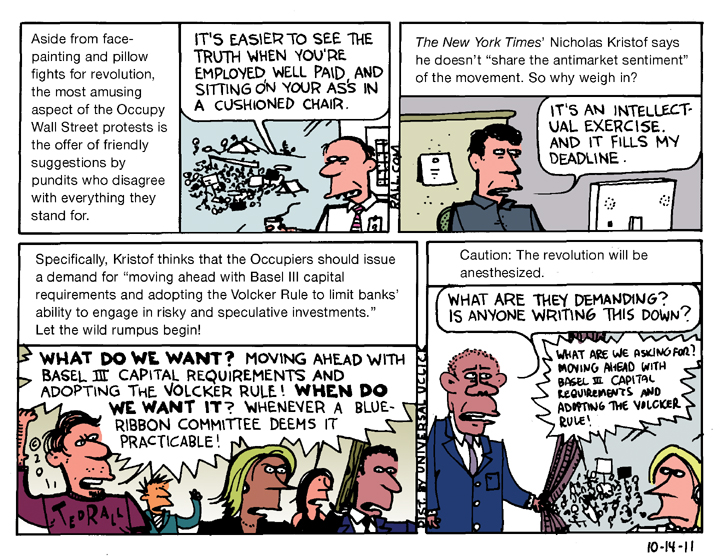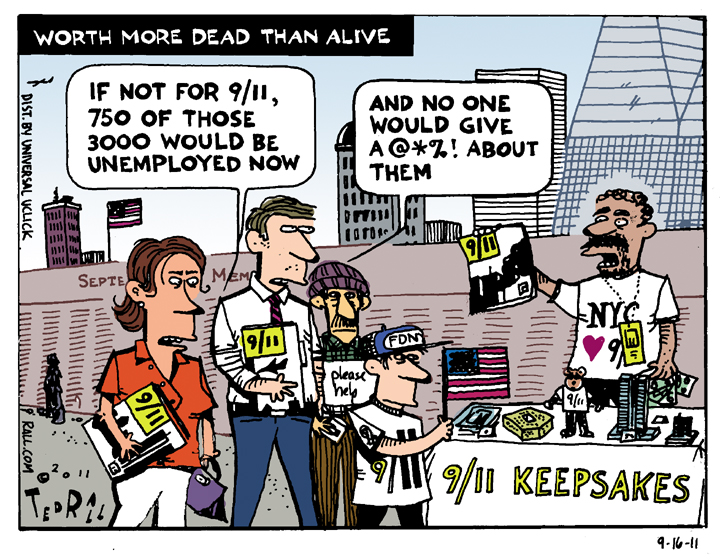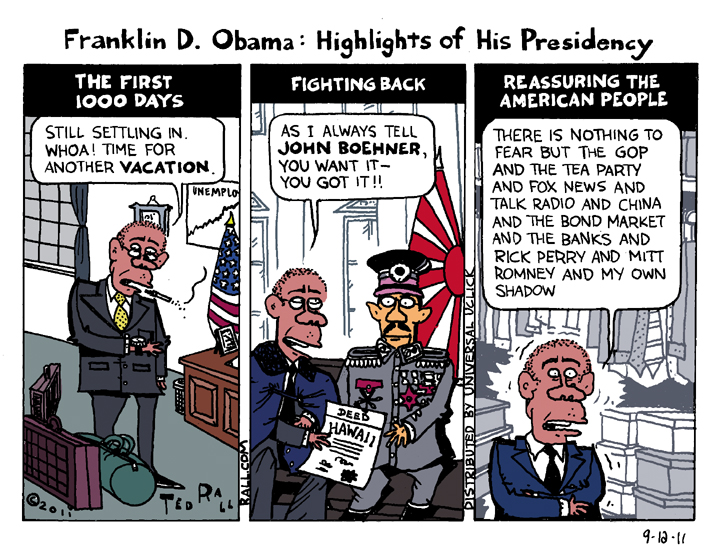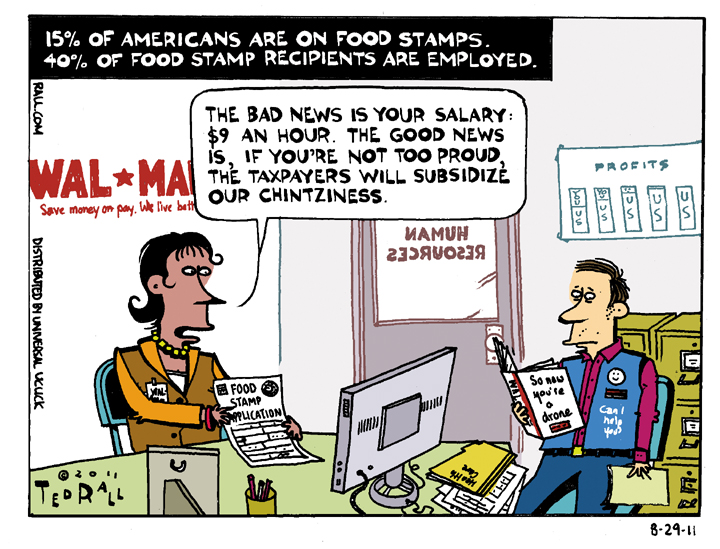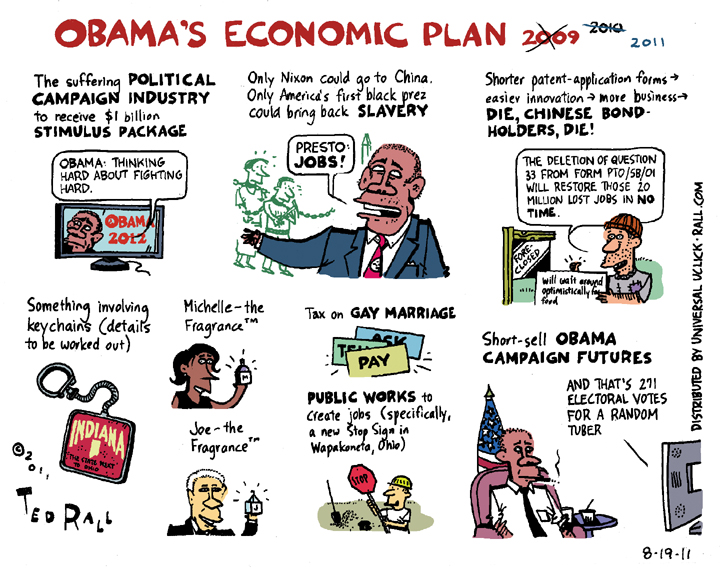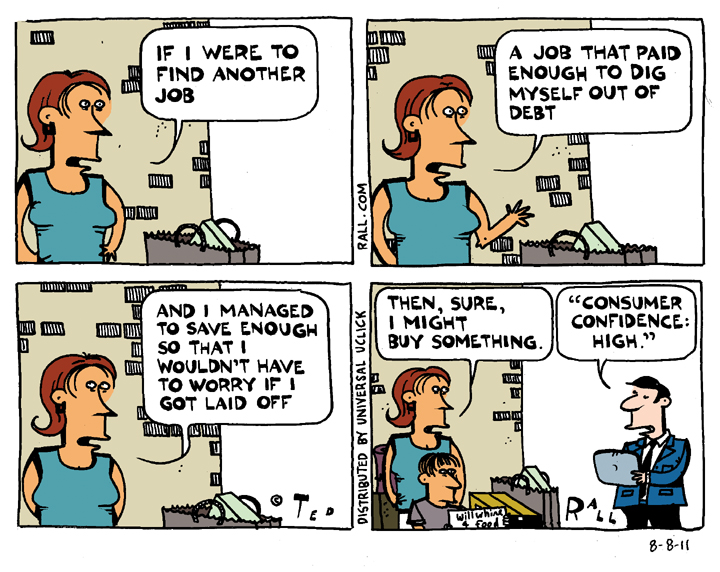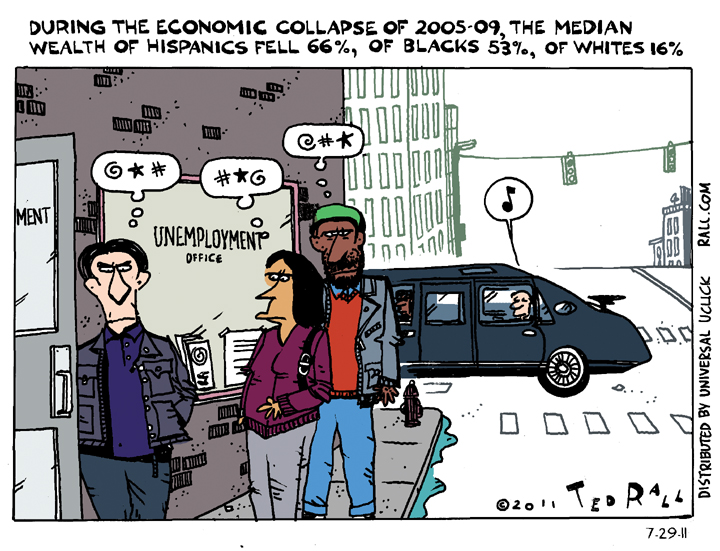Pundits suggest arcane inside the Beltway BS to purist anti-capitalist protesters, and comedy ensues.
SYNDICATED COLUMN: What’s the Matter with Obama?
It’s the Not Caring About the Economy, Stupid
As a pundit it’s my job to explain why politicians do the things they do. Every now and then, however, a pol behaves so irrationally that I have to throw up my arms and ask:
What the hell is this guy thinking?
That’s what Obama has me doing. For over two years. Why isn’t he worried about unemployment?
Thomas Frank wondered in “What’s the Matter with Kansas?” why Americans don’t vote their (liberal) self-interest. What I can’t figure out is why President Obama isn’t following his self-interest.
Obama says he wants a second term. I believe him. Every president wants one.
Americans vote their pocketbooks. Not exclusively—they care about a candidate’s values—but no president has ever been reelected with an unemployment rate over 7.2 percent. Right now it’s 9.1 percent. Unless there’s an unexpected reversal, it will still be way high by Election Day 2012.
Economists surveyed by USA Today predict that the jobless rate will be pretty much the same, 8.8 percent, at this time next year. Goldman Sachs is even more pessimistic. They think it will be 9.25 percent by the end of 2012—with a “meaningful downside risk” that it will be even worse.
Polls indicate that economic insecurity, specifically high unemployment, has been the biggest issue on voters’ minds since Obama took over in 2009.
77 percent of Americans tell Gallup the economy is getting worse. That’s up from 62 percent a month ago.
If Obama wants to get reelected he has to do something about jobs. Something BIG. Failing that—and that’s an epic fail—he has to at least be perceived as trying to do something about jobs. But he hasn’t done squat so far. And his job approval rating, now at an all-time low of 39 percent, reflects that.
I don’t like admitting this, but I’m mystified. Why isn’t Obama even trying to look like he cares about the one issue that could make or break his reelection chances?
What’s up? Are he and his advisors morons, or just out of touch? Do they have some secret jobs-related October Surprise that will magically reemploy the 22 percent of Americans who are out of work during the last few weeks of the election? Are they the Chicago Black Sox of politics, determined to throw the race to the Republicans? Psychologist Drew Westen can’t figure it out either, wondering aloud if Obama is sick in the head.
Some ask: Is Obama a Republican?
“Government doesn’t create jobs,” tweeted GOP candidate Herman Cain recently. “Businesses create jobs. Government needs to get out of the way.” Obama and his fellow fake Democrats never challenge this right-wing framing.
Maybe they believe it. “The White House doesn’t create jobs,” Obama press secretary Jay Carney said August 5th.
But the meme is wrong. In the real world where flesh-and-blood American workers have been living since 2000, businesses haven’t created any jobs. Instead, they’ve eliminated millions of them. And shipped millions more overseas.
Those job-killing trends—eliminating workers, increased automation and globalization—won’t change soon. “Workers are getting more expensive while equipment is getting cheaper, and the combination is encouraging companies to spend on machines rather than people,” Catherine Rampell recently reported for The New York Times.
There’s also a death-spiral effect. Elena Semuels of The Los Angeles Times sums it up: “Economists say the nation is stuck in a Catch-22 scenario: The economy won’t improve until businesses hire, but many won’t hire without consumer demand, which is weak because of the current state of the job market and concerns about the future.”
“Everyone says, ‘How can we have a recovery without jobs?’ [But] until I start seeing my competitors add jobs, I’m not going to do it,” Loren Carlson of the CEO Roundtable tells MSNBC.
Recovery won’t come from business. The scope of the post-2008 meltdown is too vast.
On the other hand, government can and does create jobs. Indirectly, it creates the veneer of law and order that permits commerce. Government can also employ people directly.
FDR orchestrated the direct hiring of 9 million Americans as government employees for the WPA and other programs. The federal government even hired writers and artists. Adjusted for population growth, that’s the same as 22 million people today. Obama could have done something like that in early 2009.
Too late now, of course. Obama’s inaction on the economy prompted a Republican sweep in the 2010 midterms. They won’t go along.
Keynes 101: the time for austerity is during a boom, when you can afford to save up for a rainy day. Governments are supposed to spend their way out of a recession or depression. The GOP-conceived debt ceiling deal is 200-proof insanity.
“An anti-Keynesian, budget-balancing immediacy imparts a constrictive noose around whatever demand remains alive and kicking,” wrote Bill Gross of the bond-trading firm Pimco in The Washington Post. “Washington hassles over debt ceilings instead of job creation in the mistaken belief that a balanced budget will produce a balanced economy. It will not.”
Rather than criticize this austerity lunacy, Obama is still going along. “Mr. Obama’s senior adviser, David Plouffe, and his chief of staff, William M. Daley, want him to maintain a pragmatic strategy of appealing to independent voters by advocating ideas that can pass Congress, even if they may not have much economic impact,” reports the New York Times.
“We’re at a loss to figure out a way to articulate the argument in a way that doesn’t get us pegged as tax-and-spenders,” admits a Democratic Congressional advisor. For God’s sake, grow a pair! Make your case to the public.
Anything that doesn’t have “much economic impact” isn’t going to have much electoral impact either. And neither are token gestures like a three-day bus tour, revamping the patent process, or another overhyped speech. (Scheduled for September. Because, why rush?)
As you read this Obama is off to Martha’s Vineyard, hanging out with millionaires.
Really—what’s going on? Can Obama really be that stupid? Can anyone?
(Ted Rall is the author of “The Anti-American Manifesto.” His website is tedrall.com.)
COPYRIGHT 2011 TED RALL
SYNDICATED COLUMN: Down and Out at 1600 Pennsylvania Avenue
What I Would Do If I Were Obama
Jobs, jobs, jobs. Throughout the presidency of Barack Obama, Americans have been preoccupied with jobs. Unemployed people need work. The underemployed need more work. The employed want salaries that go up instead of down.
The rich are worried too. The Depression of 2008-? is killing their stock portfolios.
Most presidents struggle to find the pulse of the people. Trapped in the D.C. bubble, they try to find out what voters want. Obama was lucky. He didn’t have to do that. The U.S. was in the midst of an epic economic collapse in January 2009, and has been ever since. It’s the only issue that everyone, rich to middle to poor, cared about. It still is.
In this single-issue environment, any idiot could have been a successful president. All Obama had to do was express sympathy and understanding while announcing a bunch of jobs initiatives.
Not hard.
Weirdly, though, Obama has focused on everything else except jobs: healthcare, gays in the military, gays getting married, more war against Afghanistan, new war against Libya, secret wars against Somalia and Yemen, the dreary showdown over taxes, budget cuts and the federal debt ceiling.
According to the latest ABC News/Washington Post poll, Obama’s approval rating is down to 39 percent. The crappy economy—and Obama’s inaction—is the simple cause.
“What Happened to Obama?” Drew Westen asked in a much-passed-around New York Times op-ed. It used to be just me. Now everyone sane agrees that Obama’s presidency has failed.
This is my favorite part of Westen’s postmortem: “Those of us who were bewitched by his eloquence on the campaign trail chose to ignore some disquieting aspects of his biography: that he had accomplished very little before he ran for president, having never run a business or a state; that he had a singularly unremarkable career as a law professor, publishing nothing in 12 years at the University of Chicago other than an autobiography; and that, before joining the United States Senate, he had voted “present” (instead of “yea” or “nay”) 130 times, sometimes dodging difficult issues.”
Westen is nicer than I am. He left out the fact that Obama had an undistinguished career as a U.S. Senator.
Is Obama a secret pawn of evil plutocrats? Does he suffer a character flaw alluded to in Westen’s piece, that he doesn’t know who he is?
Maybe. But I don’t think so. I think eight years of George W. Bush caused Americans to make a mistake. Obama was calm, so they assumed he was wise.
Obama is calm. He’s calm that it’s hard to tell if he’s sentient. But that doesn’t make him smart. Based on his record before and after becoming president, there’s a better-than-even chance that he’s not very smart.
Let’s be logical. Let’s assume that appearances don’t lie—that Obama doesn’t lose a wink of sleep over the fact that he’s presiding over a disaster that makes 9/11 look like a joke.
Let us further stipulate, for the sake of argument, that Obama isn’t stupid. That he’s merely another cynical and/or corrupt politician. If nothing else, Mr. Cynical (But Intelligent) Dirtbag ought to care about getting reelected.
Right?
If I were in Obama’s shoes, and I had any brains, if I wanted to turn those lousy poll numbers around, I’d hold press conferences to talk about jobs every day. I’d talk about jobs until the media was sick of it. Then I’d do it some more.
I’d spend two or three nights every week couchsurfing with families who were suffering, cameras rolling as I pretended to care about their silly problems with mean bosses and evil health insurers.
Most importantly, I’d set up next year’s television attack ads. I wouldn’t let a single week go by without proposing some piece of legislation related to creating jobs, alleviating the problems of the jobless, and increasing wages.
I’d send Congress huge publics-works bills. I’d ask them to hire millions of unemployed people to work for federal agencies. I’d push for higher unemployment benefits, payments that don’t expire until you find a job. Tax breaks for companies that hire. Tax deductions for those that give raises. Penalties for outsourcing jobs. Keep the Bush tax cuts, but only for the poor and middle class.
Let the Republicans kill my ideas. All the better for my 2012 ad buy! “Republicans voted against new jobs for Americans 22 times. Against helping homeowners keep their houses 15 times. Republicans: They just don’t care about you.” You get the idea.
Of course, a president can accomplish a lot by executive order. Remember that story about how Apple had more ready cash than the U.S. Treasury? Since America obviously needs the money more than Steve Jobs, Obama could have nationalized it and given it to the states in order to bolster their unemployment compensation funds.
American voters are so defeated and disgusted that they no longer demand a president like FDR or LBJ who actually fights for them. They’ll settle for one who goes through the motions.
The question for Obama and his advisors is: Are they smart enough to pretend to care about the only issue that matters to voters?
(Ted Rall is the author of “The Anti-American Manifesto.” His website is tedrall.com.)
COPYRIGHT 2011 TED RALL

